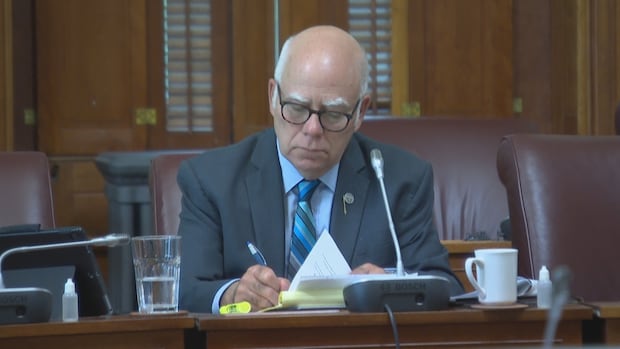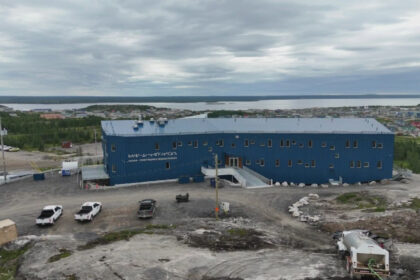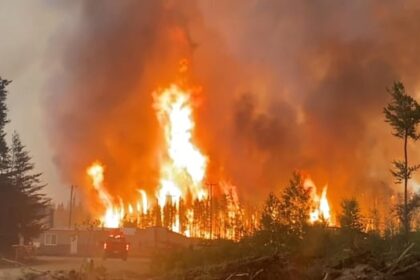New Brunswick·AnalysisFor a brief political moment, it looked like idealism might turn into a major legislative achievement for Green Party Leader David Coon.Government joins criticism of Coon legislation as flawed and duplicating existing lawsJacques Poitras · CBC News · Posted: Sep 19, 2025 3:09 PM EDT | Last Updated: 21 minutes agoGreen Party Leader David Coon makes notes during two days of hearings on his bill that proposes guaranteeing New Brunswickers the right to a healthy environment. (Radio-Canada)For a brief political moment, it looked like idealism might turn into a major legislative achievement for Green Party Leader David Coon.The Holt Liberals decided in the spring that his bill aimed at creating a right to a healthy environment in New Brunswick was at least worth studying in a legislative committee.If approved, it would be a concrete legacy for the 68-year-old Green leader after more than a decade as an elected MLA — but this week, that possibility collided with legal and political reality.”This was a bold initiative to undertake, but we wanted to be bold,” Coon said after yet another witness told the committee his bill was full of flaws.WATCH | ‘We wanted to be bold’: Green bill has bumpy ride:Green leader’s environmental rights bill collides with criticsDavid Coon’s legislation is vague, flawed and duplicates existing laws, MLAs are told.Officials from the Department of Environment told MLAs that Coon’s bill, An Act Respecting the Right to a Health Environment, duplicated the elements of several existing laws.”We are suggesting that strengthening our existing laws gives us the biggest environmental bang for our buck,” said Joanne Higgins, an assistant deputy minister at the department.’Strengthening our existing laws gives us the biggest environmental bang for our buck,’ Department of the Environment assistant deputy minister Joanne Higgins suggested during the committee meetings. (Jacques Poitras/CBC)The Liberals took that logic and ran with it, pointing out repeatedly that the province just launched public consultations on updating the Clean Air Act and will soon do the same for the Clean Water Act.”I have some concerns in terms of what the duplication is we’re seeing here,” Government House Leader Marco LeBlanc told reporters. Coon didn’t have the benefit of the government’s specialized legislative drafters, or of the resources to hold wide consultations, when writing his bill.He said the two days of hearings would fill that need, promising to incorporate the suggestions into a new version he’ll re-introduce after the next session of the legislature starts in October.”You started out by saying you could not support the bill pass[ing] in its present form and I would agree with you 100 per cent on that,” Coon told one witness.But even a revised version may not get far.Government House Leader Marco LeBlanc told the committee he sees ‘duplication’ when he compares David Coon’s bill to some of the legislation the Liberals intend to update. (Jacques Poitras/CBC)LeBlanc said he believes in the right to a healthy environment, but wouldn’t commit the Liberals to supporting a bill that corrects the problems.If the Liberals, after showing an openness to the bill, now want to kill it, their task was made easier by wide-ranging criticism during the two days of hearings.Lawyer Lyle Skinner, who specializes in legislative procedure and drafting, said it was full of flaws, inconsistencies and contradictions.”If a bill isn’t precisely written, the court has to guess what the legislature’s intentions are,” he said.Many of the objections to the bill went beyond that.The legislation would give private citizens the right to take polluters to court themselves, and would give a newly created environmental commissioner the power to investigate environmental concerns.Jerry Bos of the Agricultural Alliance of New Brunswick suggested that nuisance lawsuits against farmers could be among the unintended consequences of Coon’s bill. (Jacques Poitras/CBC)Corporate lawyer Paul Smith told MLAs that would throw off the balance that governments strike between environmental and economic concerns.Jerry Bos of the Agricultural Alliance of New Brunswick said the bill could have unintended consequences, such as nuisance lawsuits against farmers that might force them to adopt practices that turn out to be even more environmentally harmful than the ones targeted by the legal action. At a minimum, it will be a serious waste of taxpayers’ money and of government’s time, and at worst upend many of the positive aspects of life and nature that are worth protecting.— Michelle Robichaud, Atlantica Centre for EnergyAnd Michelle Robichaud, the CEO of the industry-funded Atlantica Centre for Energy think tank, said the legislation would inject new uncertainty for companies looking to invest in energy projects, including clean energy projects.”This legislation as it is written leaves so much to interpretation that at a minimum, it will be a serious waste of taxpayers’ money and of government’s time, and at worst upend many of the positive aspects of life and nature that are worth protecting,” she said.The pushback left supporters of the idea chastened. Bonnie Hamilton Bogart of the New Brunswick Environmental Network was among those who attended the committee hearings to support Coon. (Jacques Poitras/CBC)”The legalese came out loud and clear,” said Bonnie Hamilton Bogart of the New Brunswick Environmental Network. “All the ins and outs, and the potential for ambiguities and the potential for overlaps, made me realize how much work is going to be involved in any work that’s going forward on this.” Bill did have some supportSome witnesses supported the bill, or at least the thrust of it.Gord Miller, a former environmental commissioner in Ontario, said Coon’s bill was “very similar” to the one that created the position he held from 2000 to 2015.Richelle Martin of East Coast Environmental Law, a non-profit public-interest law firm, said that even with some changes, “it would still be a big step forward having any rights protected in the bill.”Hugh Akagi, chief ot the Peskotomuhkati Nation, said governments have to do “whatever it takes” to protect the environment.’It would still be a big step forward having any rights protected in the bill,’ said Richelle Martin of East Coast Environmental Law, a non-profit public-interest law firm. (Jacques Poitras/CBC)When the two days of meetings wrapped up, it was unclear whether the advice of departmental officials — that “strengthening” existing laws would get “the biggest environmental bang for our buck” — would become reality.LeBlanc would not commit the government to incorporating Coon’s ideas into the updates to the Clean Air Act and Clean Water Act, for example.”The work is being done,” he said. “We don’t want to decide what’s going to happen with that work yet.”Last week Environment Minister, Gilles LePage wouldn’t say whether the updated Clean Air Act would be tougher on polluters.”We have to adapt it to the realities of New Brunswick now and for the future,” he said.Coon said he still believes a separate bill is needed because existing legislation lacks accountability mechanisms, “and that’s not something that government departments of environment or other departments are going to embrace with open arms.”Particularly in a province where successive governments at times have been captured by corporate agendas, we need a substantive right to a healthy environment enshrined in law.”ABOUT THE AUTHORJacques Poitras has been CBC’s provincial affairs reporter in New Brunswick since 2000. He grew up in Moncton and covered Parliament in Ottawa for the New Brunswick Telegraph-Journal. He has reported on every New Brunswick election since 1995 and won awards from the Radio Television Digital News Association, the National Newspaper Awards and Amnesty International. He is also the author of five non-fiction books about New Brunswick politics and history.
New Brunswick Green leader’s environmental rights bill hits a Liberal wall











